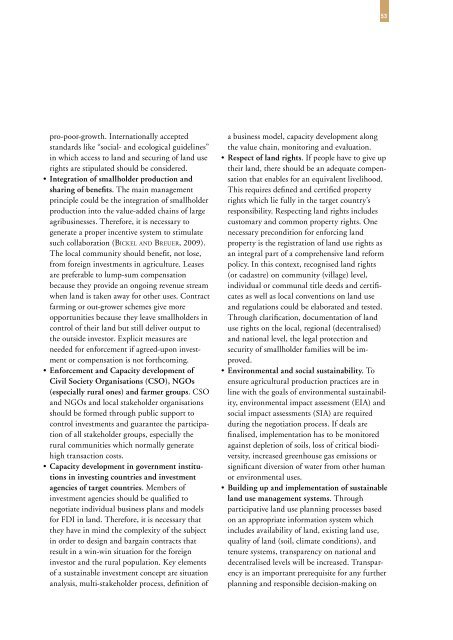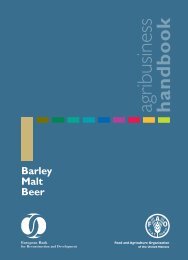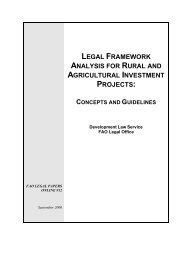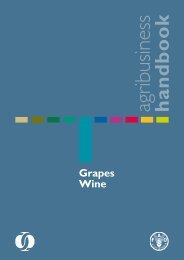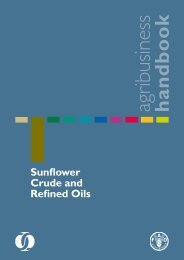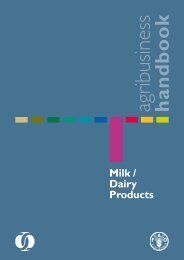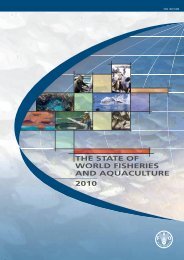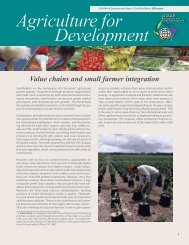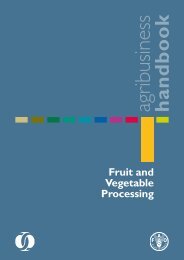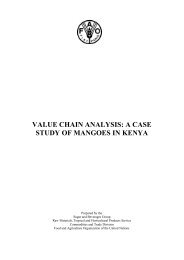Foreign Direct Investment (FDI) in Land in developing countries
Foreign Direct Investment (FDI) in Land in developing countries
Foreign Direct Investment (FDI) in Land in developing countries
- No tags were found...
Create successful ePaper yourself
Turn your PDF publications into a flip-book with our unique Google optimized e-Paper software.
53pro-poor-growth. Internationally acceptedstandards like “social- and ecological guidel<strong>in</strong>es”<strong>in</strong> which access to land and secur<strong>in</strong>g of land userights are stipulated should be considered.• Integration of smallholder production andshar<strong>in</strong>g of benefits. The ma<strong>in</strong> managementpr<strong>in</strong>ciple could be the <strong>in</strong>tegration of smallholderproduction <strong>in</strong>to the value-added cha<strong>in</strong>s of largeagribus<strong>in</strong>esses. Therefore, it is necessary togenerate a proper <strong>in</strong>centive system to stimulatesuch collaboration (Bickel and Breuer, 2009).The local community should benefit, not lose,from foreign <strong>in</strong>vestments <strong>in</strong> agriculture. Leasesare preferable to lump-sum compensationbecause they provide an ongo<strong>in</strong>g revenue streamwhen land is taken away for other uses. Contractfarm<strong>in</strong>g or out-grower schemes give moreopportunities because they leave smallholders <strong>in</strong>control of their land but still deliver output tothe outside <strong>in</strong>vestor. Explicit measures areneeded for enforcement if agreed-upon <strong>in</strong>vestmentor compensation is not forthcom<strong>in</strong>g.• Enforcement and Capacity development ofCivil Society Organisations (CSO), NGOs(especially rural ones) and farmer groups. CSOand NGOs and local stakeholder organisationsshould be formed through public support tocontrol <strong>in</strong>vestments and guarantee the participationof all stakeholder groups, especially therural communities which normally generatehigh transaction costs.• Capacity development <strong>in</strong> government <strong>in</strong>stitutions<strong>in</strong> <strong>in</strong>vest<strong>in</strong>g <strong>countries</strong> and <strong>in</strong>vestmentagencies of target <strong>countries</strong>. Members of<strong>in</strong>vestment agencies should be qualified tonegotiate <strong>in</strong>dividual bus<strong>in</strong>ess plans and modelsfor <strong>FDI</strong> <strong>in</strong> land. Therefore, it is necessary thatthey have <strong>in</strong> m<strong>in</strong>d the complexity of the subject<strong>in</strong> order to design and barga<strong>in</strong> contracts thatresult <strong>in</strong> a w<strong>in</strong>-w<strong>in</strong> situation for the foreign<strong>in</strong>vestor and the rural population. Key elementsof a susta<strong>in</strong>able <strong>in</strong>vestment concept are situationanalysis, multi-stakeholder process, def<strong>in</strong>ition ofa bus<strong>in</strong>ess model, capacity development alongthe value cha<strong>in</strong>, monitor<strong>in</strong>g and evaluation.• Respect of land rights. If people have to give uptheir land, there should be an adequate compensationthat enables for an equivalent livelihood.This requires def<strong>in</strong>ed and certified propertyrights which lie fully <strong>in</strong> the target country’sresponsibility. Respect<strong>in</strong>g land rights <strong>in</strong>cludescustomary and common property rights. Onenecessary precondition for enforc<strong>in</strong>g landproperty is the registration of land use rights asan <strong>in</strong>tegral part of a comprehensive land reformpolicy. In this context, recognised land rights(or cadastre) on community (village) level,<strong>in</strong>dividual or communal title deeds and certificatesas well as local conventions on land useand regulations could be elaborated and tested.Through clarification, documentation of landuse rights on the local, regional (decentralised)and national level, the legal protection andsecurity of smallholder families will be improved.• Environmental and social susta<strong>in</strong>ability. Toensure agricultural production practices are <strong>in</strong>l<strong>in</strong>e with the goals of environmental susta<strong>in</strong>ability,environmental impact assessment (EIA) andsocial impact assessments (SIA) are requireddur<strong>in</strong>g the negotiation process. If deals aref<strong>in</strong>alised, implementation has to be monitoredaga<strong>in</strong>st depletion of soils, loss of critical biodiversity,<strong>in</strong>creased greenhouse gas emissions orsignificant diversion of water from other humanor environmental uses.• Build<strong>in</strong>g up and implementation of susta<strong>in</strong>ableland use management systems. Throughparticipative land use plann<strong>in</strong>g processes basedon an appropriate <strong>in</strong>formation system which<strong>in</strong>cludes availability of land, exist<strong>in</strong>g land use,quality of land (soil, climate conditions), andtenure systems, transparency on national anddecentralised levels will be <strong>in</strong>creased. Transparencyis an important prerequisite for any furtherplann<strong>in</strong>g and responsible decision-mak<strong>in</strong>g on


